Thursday & Friday: Going Butt to Butt
It is late Wednesday morning and Candy Sue Weaver is on the road again, barreling through Arkansas. Her iPod is pumping Henry Gross, Eagles Live, and Delbert McClinton through her radio. She’s pumped too, and she can taste victory up the road. Literally. Weaver is a sportswoman, and she is on a 700 mile drive in her pickup, trailer in tow, towards a baseball diamond wedged between a cornfield and a soybean field in northwest Illinois. But Weaver is not a baseball player. She is a competition barbecue cook.
Competitive barbecue may be the fastest growing sport in the nation with more than 500 cookoffs across the country. Many of the cooks at each event are locals, but a growing number are, like Weaver, part of a band of roving gypsies who drive for days and get fired up to go for gold and glory. Some hit the highway every weekend from May through October.
In July that baseball field in tiny Shannon, IL, population 900, becomes the “Barbecue Field of Dreams” because Shannon is the home of the Illinois State BBQ Championship (ISBC) and the destination for a fleet of RVs and trailers loaded with meat and steel and some of the best barbecue cooks in the world. These are the real Iron Chefs towing torpedo shaped smokers the size of sportscars on their way to a throwdown Bobby Flay wants no part of.
The event, founded in 1990, is sanctioned by the Kansas City Barbeque Society (KCBS), supervisor of more than 200 events from Canada to Mexico. This year the ISBC drew 55 teams to compete in the standard four KCBS categories: Barbecue chicken, ribs, pork butt, and beef brisket. In addition Shannon has an invitation-only pork shootout called Butt to Butt that is held a day before the main event.

Competitors pay the $200 entry fee and drive in from Texas, Kansas, Minnesota, Wisconsin, Tennessee, Missouri, Arkansas, Iowa, Kentucky, and all over Illinois. Some are caterers or restaurateurs looking for publicity and trophies that will give their businesses a boost, and more than a few are hobbyists and barbecue addicts seeking bragging rights. A handful travel the circuit practically full time, staying in campgrounds and motels and occasionally vending their award winning wares at state fairs and corporate picnics.
Prize money can be significant. The biggest check goes to the Grand Champion, the team with the highest score in all four standard categories. It is $2,000 at the ISBC and it can swell to $10,000 at some other events depending on the number of teams and sponsors. ISBC pays $1,500 to the second place finisher, the Reserve Grand Champion, $500 to each category winner, with smaller checks to second through fifth place finishers.
It can add up. In 2006, a Marietta, OK, trucking company maintenance manager and his wife, Mike and Debbie Davis, known as the Lotta Bull BBQ team, set a record for winnings when they took an unprecedented 11 Grand Championships, including the biggest of them all, the The American Royal Open in Kansas City, MO, topping more than 200 teams. They probably grossed about $200,000 that year. Then there are the profits from their barbecue sauces, spice blends, DVDs, cooking seminars, and endorsements. Even after deducting about $50,000 expenses, that’s more than a lot of restaurant owners make in a year.
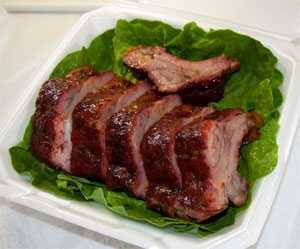
But money is not all that brings them to this baseball field near the Wisconsin border. Among the draws is the fact that the winner qualifies to compete in The Jack Daniel’s World Championship Invitational Barbecue, in Lynchburg, TN. The Jack is considered to be the Superbowl of barbecue because it is open only to teams that win state championships and other selected tough competitions, because it is held at the end of the barbecue season in late October, and because the distillery throws one heckuva party for the teams. But Weaver especially likes the fact that Shannon is “all about cooking.” Unlike other events that have become big festivals, there are no rock bands, rides, vendors, arts and crafts shows, or any distractions. “The management is wonderful, and it is so well organized. It’s beautiful here, peaceful and quiet.”
Click here for more about barbecue competitions, who runs them, the colorful people involved, and links to some of the best.
Candy Sue Weaver, a BBQr’s Delight
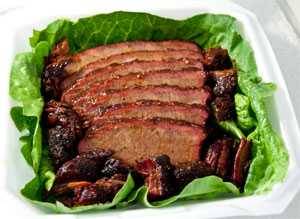
I went to Shannon to bird-dog Weaver, head of the BBQr’s Delight team, and to work as a gofer. I met her several years ago at a competition and she has been surprisingly open with me when I asked her for tips. I have judged several competitions including the Jack, but I have never gotten this close to the fire and the knives.
A wrinkle-free 56 years old, Weaver has pale blue eyes that glow when she smiles, a gentle Southern drawl, and the ability to make everyone her friend. She has been on the circuit since 2004 and enters about 15 events per year. Based out of Pine Bluff, AR, about an hour south of Little Rock, she has had some success, winning Butt to Butt a few years ago and her first Grand Championship in a major event in 2009 in Lula, MS, at the Isle of Capri Casino, beating 43 other teams. It was an especially poignant moment since her 82 year old father, who rarely comes to competitions, was there to see her victory. She dreams of being selected to compete in The Jack now that she has qualified but space is limited, and not all qualifiers make the random selection in a drawing of names of the top winners.
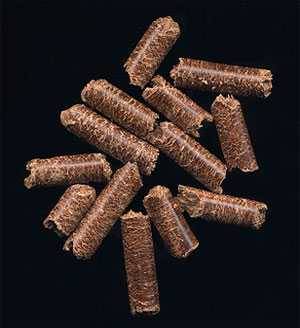
“I love competing and I especially love the people I’ve gotten to know on the circuit. Many have become best friends.” Many of the men on the circuit are former high school jocks channeling their testosterone into something better suited to their age. Weaver is a rare female team captain. “I don’t know where I got the gumption,” says Weaver. “I played piccolo in the band in high school.”
A barbecue tasteoff is slightly more rigorous than piccolo. Weaver usually hits the road on Thursday and doesn’t get to shower or sleep in her own bed again until Sunday or Monday. Because this event has the extra Butt to Butt cookoff, and, as a former winner, she was among the few invited to compete, this roadtrip is a day longer than usual. She had to knock off work on Tuesday and hit the Interstates on Wednesday. During the competition, even the cooks with automated thermostat-controlled auger-fed cooking systems rarely sleep more than an hour or two uninterrupted as they check their meat, adjust the temps of their smokers, and pace from nerves. It is also dangerous work. There are hot coals, sharp knives, and lightning. Weaver has just finished the fourth surgery on a hand smashed between her truck’s trailer ball and her trailer’s hitch. She will never play piccolo again.
BBQr’s Delight is really not much of a team. It is pretty much Weaver and, if she is lucky, a friend will ride with her or meet her at the site and work as gofer. This is pretty standard. Most “teams” are just the cook and his wife or a friend. Weaver’s team is named after her business, a division of Fiber Resources, a good sized wood products company in Pine Bluff started by her father and brother. She joined them after a career in information technology and a divorce, when her mother died in 1999. Their main product is wood pellets that fuel home heating systems. There are tens of thousands of rural homes that are heated by burning wood pellets made by compressing sawdust into tubes about the thickness of a pencil and about two erasers long. They look like rabbit food. Because they are pure wood, with no additives or binders, they burn hot and clean, and because they are made from sawdust from lumber mills, they are cheap and, unlike logs, they are critter and mold free.
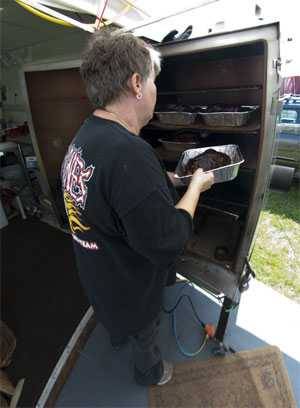
Since 1998 Weaver’s division, BBQr’s Delight, has made food grade pellets for barbecue from a wide range of woods, each with a different flavor including hickory, oak, maple, alder, apple, cherry, hazelnut, peach, and mesquite. A lot of home barbecuers use them on charcoal and gas grills instead of wood chips because they are guaranteed to be from the tree on the label and because you can measure how many you use and get precisely the amount of smoke flavor you want.
There are even a number of grills and smokers that use pellets for fuel instead of charcoal and gas. Pellets are an excellent source of energy and smoke, and because you can precisely control the amount of fuel you can easily control the temp. No hot coals, no flareups. Weaver sells more than $1 million BBQr’s Delight pellets a year, and brings huge bags with her to competitions to deliver to her many customers who hate paying the shipping fee.
For this event she also brought two smokers, Fast Eddy’s by Cookshack, called FEC 100s, state of the art pellet burners. During the cookoff these $3,600 machines sit outside her trailer under a canopy. If not for the fact that they are belching smoke you might think they were stainless steel refrigerators. The rest of the teams use charcoal. Only a few still burns logs because the flavor can be too strong and the heat is hard to control. Gas or electric cookers are not allowed in KCBS events because they are too easy and too far from traditional barbecue methods but nothing could be easier than pellet burners. In the past few years, more and more teams are pelletheads because they are pretty close to set-it-and-forget-it and they are winning.
Thursday: Preparing to go Butt to Butt
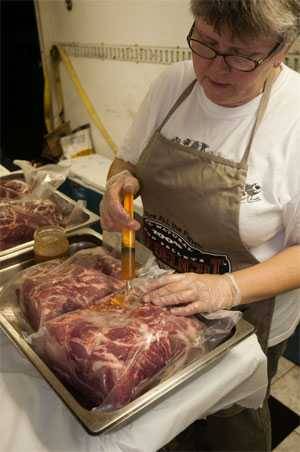
Judging of the ISBC is on Saturday, so most teams arrive on Friday and start preparation that evening. But in Shannon things start a day early with Butt to Butt. Teams arrive Thursday and start prep that night for judging on Friday. They go head to head by cooking Boston butts, a 5 to 8 pound clod of pork from the shoulder. It is made of several intersecting muscles, large hunks of fat, sinew, and a part of the shoulder blade. If roasted at normal oven temps, butts shrink and come out chewy, tough, and dry. But when slowly smoke roasted at low temperatures, usually 225 to 250°F for up to 12 hours, the classic Southern barbecue method, the result is tender, juicy, flavorful, sweet, and unctuous.
In all other categories prize money is divided between the top five winners, but in Butt to Butt it’s winner take all, $1,000. After the officials inspect her meat to make sure it has not been seasoned or doctored in advance, after dark Thursday night, Weaver begins preparing her butts in the kitchen she has built in her trailer. She will cook four butts, each about eight pounds, and select the best meat from each to submit to the judges. She begins by injecting each butt with a cup of her secret marinade, massaging it in, and allowing it to rest in a cooler for at least one hour so the salty solution can migrate through the different muscles.
About 10 p.m. she takes her butts out of the chill chest, strips off their cryovac bags, and prepares them for the smoker. She trims off excess fat and butterflies the hunk of pig in an unusual fashion that leaves one muscle, the one she calls the “money muscle”, standing upright. Click here to see how she butchers her butts and for more tips on preparing pulled pork at home from Boston butts.
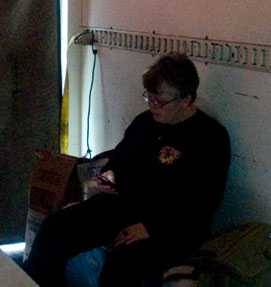
Weaver then adds her rub, a variety of spices traditional to Southern barbecue, creating a coating on all sides. There’s salt, garlic powder, black pepper, and an unlabeled bottle with a blend of other spices. I ask what’s in it and she just smiles. Click here for a good spice rub recipe. Not hers, but it will do.
She is meticulous about sanitation, wearing gloves, using a disposable cutting board, wiping counters with Chlorox wipes, and keeping everything that is perishable well chilled. Click here for more on barbecue food, fire, and knife safety.
The meat goes into her smoker at 240°F about midnight, right in the middle of a bodacious thunderstorm complete with horizontal rain driven by 30 mile an hour winds. Two years ago lightning hit the chain link fence just a few feet from her trailer showering sparks in a spectacular and frightening fireworks display. During the storm several cooks run from site to site helping each other take down their canopies and tents and tie down anything loose. Then they get back to their meat.
Friday: Judgment Day

She sleeps in spurts in the trailer, awakened frequently by thunder and an annoyingly chirpy alarm clock that reminds her to check her cooker temp, check the meat temp, and spritz the meat with apple juice to cool the surface and add moisture and flavor. She also groggily checks her Blackberry regularly to see the progress of the storms. “Meat cooks faster in high humidity,” she says.
When the pork gets to be the color she likes, a deep ruddy brown, Weaver wraps it in aluminum foil, tosses in a few ounces of flavorful liquid whose ingredients are also secret, and puts it back in the cooker. The technique is called the Texas Crutch. This creates a small amount of steam and helps tenderize the meat. But she walks a tightrope. Too much steam and the meat gets mushy, and that’s a ticket to the bottom of the rankings.
By dawn the last of the storm waves has passed and the cooks inspect their rigs, repair damage, up their tents, and whup up the hearty breakfasts necessary to fuel these perpetually hungry and often oversized omnivores.
Clear skies can be seen over Iowa moving our way. One minute we are looking for the storm shelter, and the next minute we are looking for the SPF 40. Weaver checks her meat temps and she is pleased with their progress. With her iPod blaring Motown hits, Weaver and her friend Tana Shupe break into a nervous dance.
Shupe is the recently retired director of The Jack and a member of the KCBS Board of Directors. She drove 6 hours from Tullahoma, TN, with two of the judges, David Roper and Linda Gould, to meet Weaver in Memphis, and they all rode together the rest of the way to Shannon. Shupe is there to help Weaver if asked, but Weaver is on autopilot and needs little help. She has her routine down, responding to the alarm clock all day long.
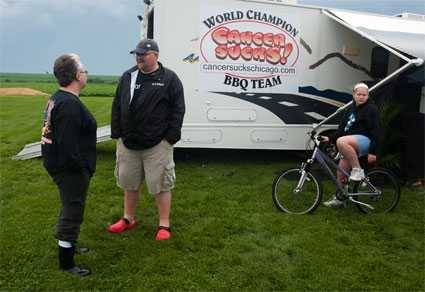
With several hours to go before the judging, Weaver has time to catch up with her friends. On the competition circuit, many of the cooks see each other every week or two and deep bonds are formed. Among her chums is Scott Johnson of the CancerSucksChicago.com team and one of his two daughters, Zoe, age 11.
Johnson’s wife, Corliss, died of cancer in 2003 and in 2005 Scott, Zoe, his younger daughter Lexi, and his sister Liz, hit the BBQ road raising awareness and money for cancer research. They have not just acquitted themselves well, they have moved into the upper echelon of the teams, culminating with the Grand Championship at The Jack in 2006. Zoe helps by preparing the final boxes for turn-in. Appearance is 1/3 of the score, so this is not a trivial matter. You can follow CancerSucksChicago.com on their blog.
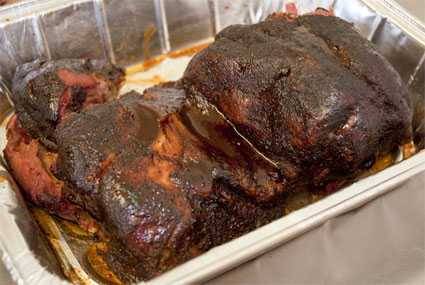
Mid-morning, after cooking her butts about eight hours, Weaver removes them from the 240°F cooker and puts them in another cooker at about 140°F to hold. Turn-in time is 5 p.m. At 3:15 Weaver is ready to sauce them. She opens the foil packages and drains the whiskey colored liquid. She sets a bit aside to mix back into the sauce for touching up the final presentation meat. One could build a small aircraft with all the aluminum foil used at one of these events.
The mahogany colored meat has undergone profound changes. Now about 25% lighter than when it went into the cooker, the spices in the rub have roasted and fused with the surface, forming a crisp crust affectionately called bark. Just beneath the surface, smoke and combustion gases have penetrated and turned a 1/8″ layer bright pink, the telltale smoke ring that the uninitiated often mistake for undercooked meat when it is really a badge of expertise.
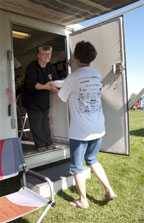
Much of the fat has melted and rendered off, but much of it has circulated around the muscle fibers wetting and lubricating them. The sheath of collagen that surrounds each fiber and connects it to bones and other fibers also melts adding richness and moist tenderness.
Weaver offers me a taste. It is perfect. It is mellow, slippery between tongue and roof, almost buttery, and slightly salty and tangy from the rub and injections, with a hint of heat in the finish. But Weaver is not done.
About an hour before turn-in, she invites Shupe and me to taste three sauce blends she has made by doctoring her favorite commercial product, Smoky Mountain Smokers Barbecue Sauce. She dips shards of pork into each, and we close our eyes and taste. The sauce is tomato based, thick rich, complex, sweet with molasses, with a slight hot pepper bite in the end. But I cannot concentrate on the sauce, the meat is so entrancing. It is impossible for me to say one blend is better than another. Shupe voices a well-educated preference and Weaver agrees. She paints the meat liberally and thoroughly with their choice. The sauce-coated meat then goes back into the cooker for a short while to bake on the glaze. One coat is all it needs. Click here for more about classic American barbecue sauce types.

About 45 minutes before turn-in, Weaver removes the sauced meat. She then prepares her presentation. With a twist of her fingers, the bone slides out like it is coated in oil. The money muscle is sliced and the others are pulled into shreds about 3″ long. They get a splash of sauce mixed with the juices that the meat gave up so graciously.
Each team must deliver their meat in a 9″ x 9″ styrofoam box. Weaver has a particularly artful presentation, among the best I have seen, but she will not let me show it here lest her competitors imitate it. Her box shows the glowing dark bark of the money muscle glazed with sauce, but the meat underneath is relatively unadorned. A bite brings crunch from the crust of spices, sweetness of the sauce, but in the end, the flavor is pork. On the other hand, the pulled pork is saucy, literally and figuratively. Many cooks turn in a box piled with pulled pork drenched in sauce. Weaver’s box is like a Bento box.
In a normal competition there must be at least 6 samples, one for each judge, but there are 10 judges for Butt to Butt, so she must really pack it in the box. The rules allow lettuce, parsley, and a few other garnishes. Parsley is the rage nowadays, so ever the contrarian, Weaver opts for romaine today. The lid is closed and Weaver hands her baby to a competition official who will deliver it to the judging tent where it will be assigned a new number so nobody can know which sample is from which team.
The hot samples are whisked through the check-in and the boxes are opened and lined up on a table for the judges, many of whom are also competitive cooks. The 10 Butt to Butt judges are more experienced than the 60 ISBC judges due in on Saturday. They troop the line and ogle the entries.
Then they sit, pass the boxes around, take out samples, and set them on a placemat divided by grid lines. They taste in silence and rate the meat for appearance, taste, and tenderness, up to 9 points for each. A perfect score is 27. Three judges give Weaver’s their highest scores, but two complain that there are pockets of seasoning in their large chunks and they give it low scores. Apparently Weaver’s injection was not properly dispersed through the money muscle.
By 8 p.m. all the other teams have rolled in for the Saturday’s scrum and set up camp. RVs, colorfully painted trailers, catering trucks, canopies, pup tents, LaFuma lounge chairs, card tables, kids, dogs, boom boxes, and Frisbees make the outfield of the baseball diamond come alive. The teams gather in the big tent to hear Mike Lake explain the rules for ISBC and to announce the results of Butt to Butt.
Weaver professes fatalism and says “If it can’t be me, I want it to be one of my customers” but her demeanor all day has said clearly that she’s in it to win it. I have not told her what I heard in the judging tent.
The competitors line up for the announcement. Lake announces fifth, fourth, third, and second, leaving first and sixth standing. Weaver is fourth.

The winner is Todd Johns of Pork Pullin Plowboys, an IT project manager from Blue Springs, MO. And he is indeed one of Weaver’s customers.

An exhausted Weaver is philosophical. “I did the best I could with what I had.” Blaming the pig? “Absolutely not.” I ask if she ever thinks about quitting. “Yeah, but every time I get close to burning out I win something.”
She professes to be happy for Johns and plans to buy an ad in the KCBS newspaper, the Bull Sheet, with Johns’ photo, congratulating him and bragging that he uses BBQr’s Delight. Competition is not just an avocation for Weaver, it is good for business. “You can’t put a dollar value on his win” she says.
Weaver looks whipped after Friday’s award ceremony, but she has no time to waste. She has to prepare for Saturday when she must cook pork butt again as well as chicken, ribs, and brisket. The new pork butts will go into the smoker around midnight as will the brisket.
If tradition holds, Johns will not do well in Saturday’s judgings. The Butt to Butt winner rarely does. He fingers the check, calls his wife with the news, and muses “I’m thinking of going home now.” Good thing he doesn’t.
After dark old friends visit into the wee hours as they tend their fires and generators. Beer, whiskey, dinner, cigars, and lies are shared.


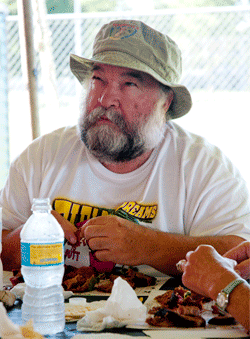
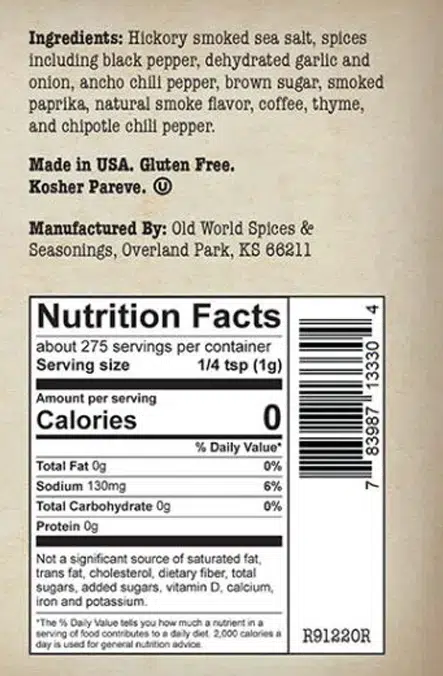
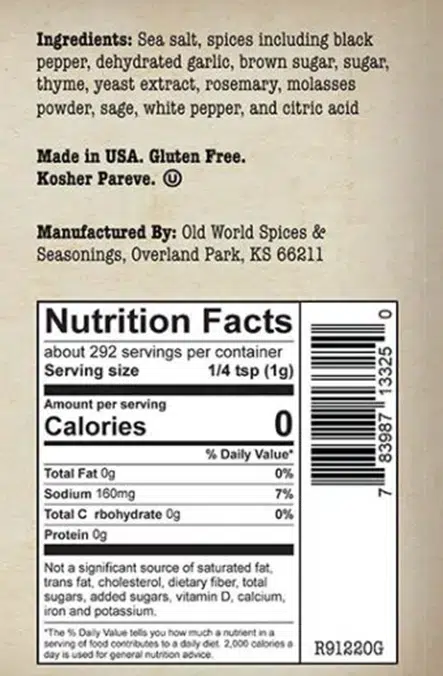
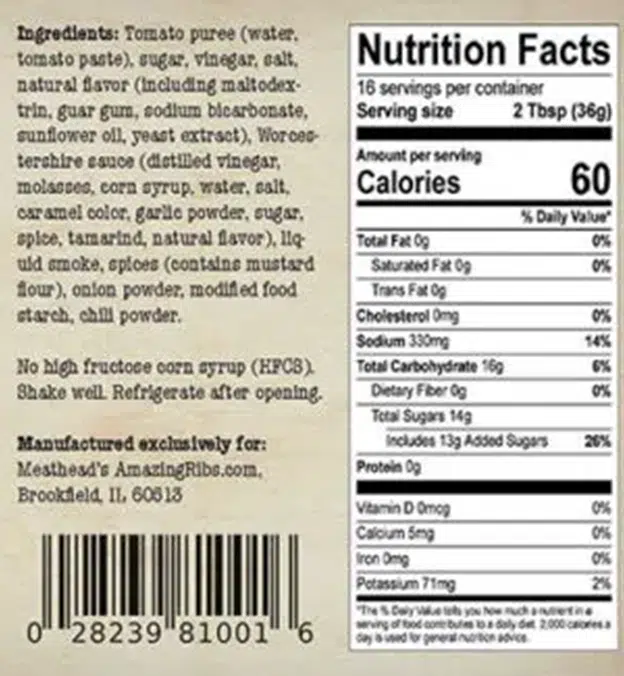
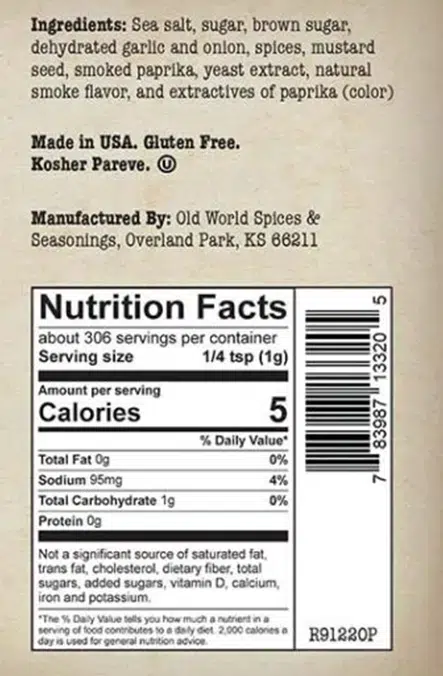
High quality websites are expensive to run. If you help us, we’ll pay you back bigtime with an ad-free experience and a lot of freebies!
Millions come to AmazingRibs.com every month for high quality tested recipes, tips on technique, science, mythbusting, product reviews, and inspiration. But it is expensive to run a website with more than 2,000 pages and we don’t have a big corporate partner to subsidize us.
Our most important source of sustenance is people who join our Pitmaster Club. But please don’t think of it as a donation. Members get MANY great benefits. We block all third-party ads, we give members free ebooks, magazines, interviews, webinars, more recipes, a monthly sweepstakes with prizes worth up to $2,000, discounts on products, and best of all a community of like-minded cooks free of flame wars. Click below to see all the benefits, take a free 30 day trial, and help keep this site alive.
Post comments and questions below
1) Please try the search box at the top of every page before you ask for help.
2) Try to post your question to the appropriate page.
3) Tell us everything we need to know to help such as the type of cooker and thermometer. Dial thermometers are often off by as much as 50°F so if you are not using a good digital thermometer we probably can’t help you with time and temp questions. Please read this article about thermometers.
4) If you are a member of the Pitmaster Club, your comments login is probably different.
5) Posts with links in them may not appear immediately.
Moderators